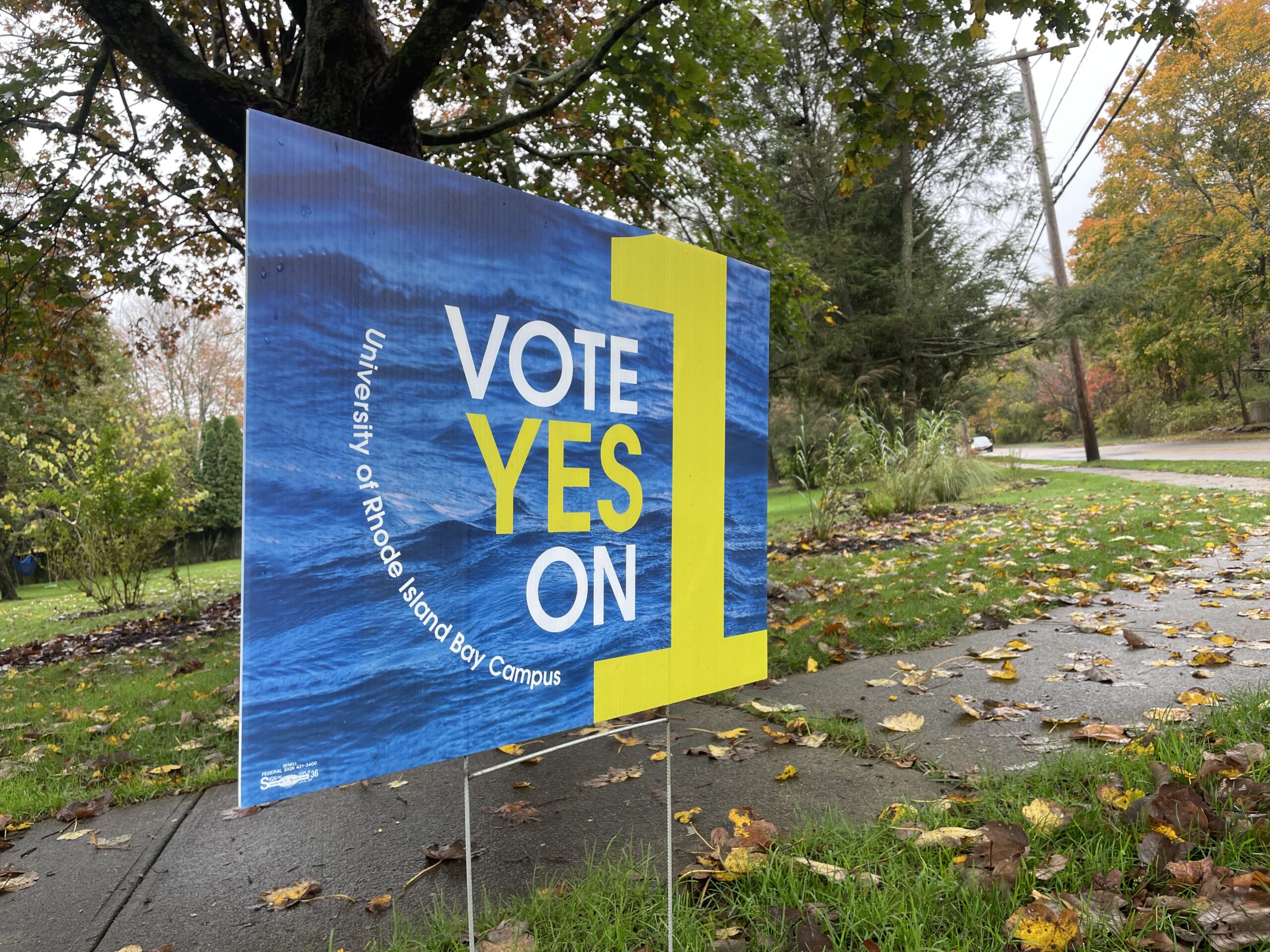Committee seeking bond approval for repairs at Bay Campus
“Vote Yes on 1” asks voters to support a $100 billion bond going toward renovations for the URI bay campus. PHOTO CREDIT: Maddie Bataille | Photo Editor
This year’s Rhode Island midterm election on Nov. 8 holds great potential for the University of Rhode Island’s Graduate School of Oceanography, with its referendum question on the ballot.
The question proposes a $100 million bond be given to URI “for repairs and to construct new facilities on the University of Rhode Island’s Narragansett Bay Campus in support of the educational and research needs for the marine disciplines,” the official ballot states.
Because of the potential this bond holds for the GSO, the University created the “Yes on 1” committee, which was formed about two months ago, according to Anthony Marchese, dean and professor of the College of Engineering and a member of the committee.
The committee is also supported by President Marc Parlange, who Marchese said is interested in making the Bay Campus a destination for all URI community members, not just those in the field of oceanography or engineering.
Marchese said that the team meets every other week in order to brainstorm the best ways to spread the word to Rhode Island voters about the referendum and its benefits.
“It’s our job to really educate our community, to say, you know, this is the reason that we’re asking for this bond to be voted on, and this is how it will positively impact the state and the taxpayers,” Marchese said. “That’s really the role of the committee.”
According to Paula Bontempi, dean of the GSO and member of the “Yes on 1” committee, the bond will be the second phase in a referendum passed in 2018 that gifted $45 million to the GSO.
According to Marchese, these previous bonds were used for the GSO to build a new pier to fit the larger ships the GSO has. These ships, such as the Narragansett Dawn, which was named last year, are funded by the National Science Foundation.
Both bonds will be used in order to repair the infrastructure of the Narragansett Bay Campus’s buildings, which, according to both Bontempi and Marchese, is crucial.
“At the most literal level, we have 60-year-old buildings that are crumbling,” Bontempi said. “When it rains, water pours out of the ceiling and into the electrical sockets. That’s just wrong. It’s not how we conduct research for faculty or students.”
This leakage, Bontempi explained, usually occurs in the GSO’s per- and polyfluoroalkyl substances (PFAS) labs.
According to the United States Environmental Protection Agency (EPA), PFAS are “widely used, long-lasting chemicals, components of which break down very slowly over time.” PFAS can be found in water, air, fish and soil and are harmful to both humans and animals.
The University of Rhode Island has a super-funded research program called Sourced, Transport, Exposure and Effects of PFASs that is funded by the National Institute of Environmental Health Services. According to Bontempi, it is important that these labs stay sterile for PFAS research to succeed, and because of the building’s current condition, that isn’t always the case.
“Our ocean engineering building was built 50 or 60 years ago as a temporary structure, and it’s in complete disrepair,” Marchese said. “No faculty should have to work in that building.”
In addition to what the bond will do for the physical campus, both Marchese and Bontempi stressed that the state putting money into the Bay Campus would ultimately allow for money to go back into that state because of the benefits the GSO creates for Rhode Island’s Blue Economy.
Bontempi explained that the Blue Economy, or the economy linked to Rhode Island’s marine environment, is worth $50 billion a year and that this number is expected to double by 2030. She said she wants the work at the GSO to make Rhode Island a place people want to live and also receive their education.
“Four-hundred-and-thirteen miles of coastline,” Bontempi said. “People summer here and live here, and we can be the head of this sector, we just have to plan ahead. URI is a public university in the state, and we want people to know who we are on the Bay Campus and what we do and that we support the state on things like climate change and sea levels rising.” For more information on the “Yes on 1” campaign, you can visit the committee’s website. The URI team urges students to register to vote to ensure the future of their campuses.





